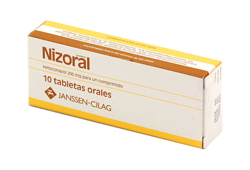Saudi Food and Drug Authority warns about possible hepatotoxic effect associated with the use of oral ketoconazole (marketed as Nizoral®). Orally administered ketoconazole is used for several fungal infections when there is resistance or intolerance to other treatments.
Very rare cases of serious hepatic toxicity, including cases with a fatal outcome or requiring liver transplantation, have occurred with the use of oral ketoconazole. Some patients had no obvious risk factors for liver disease. Cases have been reported that occurred within the first month of treatment, including some within the first week. The reported incidence of hepatotoxicity has been about 1:10,000 exposed patients, but this probably represents some degree of under-reporting, as is the case for most reported adverse reactions to drugs.
Advice for healthcare professionals:
1. Because of the risk for serious hepatic toxicity, Nizoral® tablets should be used only when the potential benefits are considered to outweigh the potential risks, taking into consideration the availability of other effective antifungal therapy.
2. The risk of serious hepatic toxicity increases with longer duration of treatment; courses of greater than 10 days should only be given after full consideration of the extent of treatment response and the risk benefit of continuing treatment
3. Liver function must be monitored in all patients receiving treatment with Nizoral® tablets. Liver function must be monitored at weeks 2 and 4 of treatment, then continued monthly, with discontinuation of treatment if any liver parameters are elevated above 3 times the normal limit.
4. In patients with raised liver enzymes, or those who have experienced liver toxicity with other drugs, treatment should only be started in exceptional cases, where the expected benefit exceeds the risk of hepatic injury, and consideration should be given to monitoring liver function tests (LFTs) more frequently.
5. All patients should be counselled at the start of treatment with basic knowledge of the signs and symptoms suggestive of liver toxicity.
Advice for patients:
1. Tell your doctor If you have ever had liver problems. You must inform your doctor of any previous liver disease.
2. Liver problems can sometimes happen, even with a short course of Nizoral® tablets.
3. Stop taking Nizoral® tablets and tell your doctor if you have these symptoms:
a) Have long-lasting severe headache or blurred vision
b) Have a severe lack of appetite
c) Lose a large amount of weight (anorexia)
d) Feel sick (nausea) or are sick (vomiting)
e) Feel unusually tired or feverish
f) Get stomach pain
g) Have muscle weakness
h) Get yellowing of the skin or whites of the eyes
i) Pass unusually dark urine or pale stools


